
Related
Topics
Guests
- Juan Manuel García Passalacquaa senior political analyst with The San Juan Star, a daily newspaper in Puerto Rico.
This year marks the 100th anniversary of the Spanish-American War and the U.S. colonization of the Caribbean island of Puerto Rico. Indeed, Puerto Rico is this country’s largest and longest-held colony. And now Congress appears ready to finally take up the question of Puerto Rico’s status once and for all. As early as next week, the House is expected to take up a bill sponsored by Representative Don Young, a Republican from Alaska, that calls for the island’s 3.8 million people to vote on independence, statehood or commonwealth status.
Transcript
AMY GOODMAN: This is Pacifica Radio’s Democracy Now! I’m Amy Goodman, with Juan González. Juan, you’ve been following very closely the latest developments in Congress around the status of a bill that will determine the future of Puerto Rico. This year marks the hundredth anniversary of the Spanish-American War and the U.S. colonization of the Caribbean island of Puerto Rico, something you point out in both your pieces this week in the New York Daily News. Indeed, Puerto Rico is this country’s largest and longest-held colony. And now Congress appears ready to finally take up the question of its status once and for all.
JUAN GONZÁLEZ: Yes. As early as next Thursday, or March 4th, the House of Representatives will be beginning debate and voting on a bill called the Young bill, H.R. 856, which would authorize a plebiscite among the people in Puerto Rico by the end of this year as to the status of the island.
And we have with us from Puerto Rico, one of the islands’ most well-known political analysts, Juan Manuel García Passalacqua, who will be able to talk to us a little bit about what has been happening in the past couple of years and why at this moment this bill — it suddenly looks like it’s going to make its way through Congress, whereby Congress would actually commit itself to abide by whatever decision the people of Puerto Rico make.
So, I’d like to welcome Juan Manuel García Passalacqua to the show.
JUAN MANUEL GARCÍA PASSALACQUA: Welcome. Thank you very much, Juan. And I’m very pleased to be with you.
JUAN GONZÁLEZ: Could you tell us a little bit about what are the events that led up to the bill at this time and why Congress feels so — why it’s so important at this point to put this bill through?
JUAN MANUEL GARCÍA PASSALACQUA: Well, I think we have to go back to the Vietnam War to begin talking about this. After Vietnam, the United States recognized at last that its traditional policy of superiority over foreign peoples was dead, and it began a reevaluation process of its own role in history. That began in 1975, a reevaluation with the policy regarding territories and Puerto Rico, which was ordered by Henry Kissinger. That, in turn, brought a debate between 1989 and 1991 on what to offer to Puerto Rico. That effort was defeated in the Senate when the Senate refused to offer statehood. That was revived by the Puerto Rican people themselves when they, regardless of the Congress, held their own plebiscite in 1993, rejected statehood, demanded a compact of free association with the United States. And it took the Congress all these four years before it would respond. And it looks like, as you very well said, Juan — it looks like it will respond next Wednesday from 10 a.m. to 10 p.m. in the floor of the House.
JUAN GONZÁLEZ: And in terms of the current status of commonwealth, for many years, the United States government maintained that Puerto Rico had achieved self-determination and that the commonwealth that existed, whereby Puerto Ricans were citizens, but second-class citizens, didn’t pay any federal taxes, didn’t have representatives, voting representation in Congress, but were considered to be a territory of the United States. What has happened in this process with the commonwealth as an option?
JUAN MANUEL GARCÍA PASSALACQUA: Well, the Congress of the United States, in the Republican hands, has issued a very damning report. Remember, commonwealth was established as a Republican initiative by Dwight D. Eisenhower. So, they have rejected all the allegations that the U.S. made before the United Nations that commonwealth was a nonterritorial entity. And they have called the representations made by Dwight D. Eisenhower before the United Nations — and I’m quoting — a “misunderstanding,” end of quote. So the Republican Party has, in fact, abandoned commonwealth as it exists. It has revoked the multinational tax corporation exemptions that was the material basis for commonwealth status. And it looks like it’s ready to bite the bullet between two forms of sovereignty, either union by admission or union by treaty. And those seem to be the two options now open for Puerto Rico.
JUAN GONZÁLEZ: Well, in terms of what would happen in case the Puerto Rican people voted in a majority for statehood, I don’t think most Americans clearly understand Puerto Rico has 3.7 million people. As such, it has greater population than 26 other states in the union. If it did become the 51st state, that would mean that it would have two senators and at least six, possibly seven, congressmembers. What would that do in terms of the political balance of forces in the country as a whole, in the United States as a whole?
JUAN MANUEL GARCÍA PASSALACQUA: Well, that was the discussion, Juan, that occurred last night for a whole hour in the Republican conference in the House of Representatives, with the participation of 100 congressmen. And the debate became so dramatic that at one point Bill Archer was overheard saying, “Why are we dealing with this crap?” which is quite a statement. They split evenly on whether Puerto Rico could be admitted as a Hispanic state, with two congressmen — I mean, seven congressmen and two senators speaking Spanish and forcing a bilingual deliberations in the House and Senate. They split over the cost of statehood. They split over whether statehood would imply all Democratic senators and all Democratic representatives. And it looks like it was a dramatic event. It has been reported widely in the press here in detail. More than one source have said the Republican Party is — and I’m quoting — “edging for a bloodbath” in the floor of the House on the issue of the implications of statehood for the United States.
AMY GOODMAN: What about the congressmembers actually from Puerto Rico, I mean, representing different areas — in New York, José Serrano, Nydia Velázquez; in Chicago, Luis Gutiérrez?
JUAN MANUEL GARCÍA PASSALACQUA: Well, the three of them have expressed their opinion that the alternatives for Puerto Rico should not be colonial. And the three of them reject any colonial alternative, such as the one existing now. José Serrano supports the bill. The other two oppose the bill, unless the commonwealth definition that exists now in the bill, which is a territorial form of commonwealth under congressional discretion, is scratched. So, that is also occurring just as we’re speaking here. Negotiations are underway for José Serrano to introduce an amendment that would offer a commonwealth that is sovereign and would enter into a treaty of union with the United States.
JUAN GONZÁLEZ: Juan Manuel, if I could clarify for our listeners across the country that specific issue involved with commonwealth, Puerto Rico right now is considered by the United States Supreme Court and by Congress an unincorporated territory — in essence, a possession of the United States. And the problem that the commonwealth proponents want is that they want the commonwealth to be, in essence, a union between two sovereign countries —
JUAN MANUEL GARCÍA PASSALACQUA: That is correct.
JUAN GONZÁLEZ: — that mutually come together. And, of course, Congress, to do that, would have to admit that Puerto Rico itself right now has its own sovereignty as a nation to be able to enter into a joint compact. Is that right?
JUAN MANUEL GARCÍA PASSALACQUA: No, what — no, the solution to that, Juan, has been issued in a Congressional Research Service report. It says what Congress would have to do would be to dispose of the territory. In other words, Congress, in the exercise of the territorial clause, would dispose of the territory and simultaneously enter into a treaty of union with the sovereign nation of Puerto Rico. That’s the technical way of doing it. At present, commonwealth is, as you very well said, an unincorporated territory of the United States subject to the sovereign power of the Congress. Congress would have to submit to its own members, in a vote, a resolution disposing of the territory, which is what I explain in the recent issue of Current History that I guess you have taken a look at, and after disposing of the territory, even simultaneously, enter into the treaty of union with the sovereign nation of Puerto Rico.
JUAN GONZÁLEZ: Now, in terms of what’s happened within the Republicans, this is broken up into two groups. Newt Gingrich is on record as being a supporter of this bill. So is President Clinton, so it supposedly has bipartisan support.
JUAN MANUEL GARCÍA PASSALACQUA: That is correct.
JUAN GONZÁLEZ: But there are others, like Gerald Solomon of New York state, who’s also the chair of the Rules Committee, who has been insisting that he will force an amendment that would require Puerto Rico to have English being taught in the public schools of the island, before —
JUAN MANUEL GARCÍA PASSALACQUA: No.
JUAN GONZÁLEZ: — it would be admitted as a state. Is that correct?
JUAN MANUEL GARCÍA PASSALACQUA: Juan, it is not English being taught in the schools. English is now taught in the schools. It would be teaching in English in all schools. Now, you can imagine, Juan, a bill that will say — and Solomon announced this in the front page yesterday of all the newspapers in Puerto Rico —
AMY GOODMAN: This is Gerald Solomon of New York.
JUAN GONZÁLEZ: Right.
AMY GOODMAN: Republican.
JUAN MANUEL GARCÍA PASSALACQUA: Gerald Solomon of New York, who has a reason for that. Remember, Gerald Solomon —
JUAN GONZÁLEZ: And chair of the House Rules Committee.
JUAN MANUEL GARCÍA PASSALACQUA: Gerald Solomon is a congressman from upstate New York. His neighbor is Quebec. So he knows what Quebec is all about. And his district has a lot of Quebecers that go there and try to buy things in French. And his constituents are not too happy about that. So I can understand Gerald Solomon’s insisting that all subjects, from kindergarten to college, in all schools in Puerto Rico be taught in English, including, Juan, El Quijote. Well, you know, it’s a little weird. But that’s what he says. He’s going to introduce the amendment. I discussed the matter this morning so I would be able to offer you this piece of information in the program. He claims he has 250 votes for that. It’s a majority. And he thinks his amendment will carry.
AMY GOODMAN: You know, I was very struck, Juan, by your description of Puerto Rico in your piece in the Daily News. And I also want to let people know that they can get Juan’s pieces every Tuesday and Thursday in the New York Daily News on the web at www.MostNewYork.com. That’s www.MostNewYork.com. You said that if Puerto Rico became a state, it would be the poorest, per capita income in ’95 more than $7,000, less than half of what it was in Mississippi, which was at the bottom.
JUAN GONZÁLEZ: Right. And that would necessitate enormous amounts of money from the federal Treasury in transfer payments to equalize, for instance, Medicaid benefits, SSI and other federal benefits that Puerto Rico does not now receive proportionate to other states. And that’s another argument, clearly, of those in Congress who want to shrink government, that it would be at a huge cost to the federal Treasury under statehood. What is your sense of that argument, Juan Manuel?
JUAN MANUEL GARCÍA PASSALACQUA: Let me tell you, it was discussed in the Center for National Policy in Washington at a session that was held in private three weeks ago. The Harvard international [inaudible] school issued a paper saying that Puerto Rico will never — and they said “never” — converge to the poorest state of the union level of income if it remains a territory of the United States, and that Congress has to decide to make Puerto Rico a state now or not, because postponing it for 20 years, in the hope that at some point Puerto Rico will converge with Mississippi and not require $4 billion additional in welfare funds, is not possible.
To that, the World Bank issued a paper in answer to the Harvard Law School paper at the Center of National Policy. And you people can obtain it from the Center of National Policy. Maureen Steinbruner is the chairman. Remember, the former chairman is Madeleine Albright. And Maureen will provide it to you. The World Bank answer was, the only way you can put Puerto Rico on its feet, instead of asking or looking for convergence with the United States, is to try to make it converge with the rest of the world, and instead of incorporating its economy within the United States, incorporating its economy to the global economy, and permit it to enter into all sorts of international agreements.
So the debate has been very serious. It has been formalized in these two papers in the Center for National Policy. And I think Juan is absolutely correct: There is no way that Congress is going to invite to join the union a state that is going to cost Congress $4 billion additional a year in welfare funds.
AMY GOODMAN: Well, I want to thank you very much for joining us, Juan Manuel García Passalacqua, and let people know that your article on the Puerto Rico question revisited is in the current issue of Current History. That’s February of 1998. And Juan’s piece is in the New York Daily News, which you can get on the web at MostNewYork.com.
And if you’d like to get a copy of today’s show, you can call 1-800-735-0230. To order a cassette copy, that’s 1-800-735-0230. Democracy Now! is produced by Dan Coughlin, with Hesu Coue and Jeremy Scahill. Errol Maitland engineered from New York. Michelle Garcia is our web manager. Julie Drizin is our executive producer. I’m Amy Goodman, here with Juan González, for another edition of Pacifica Radio’s Democracy Now!

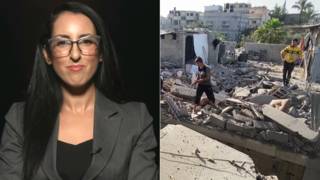
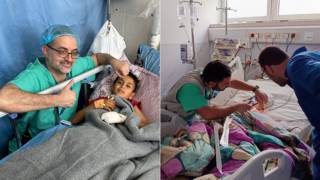
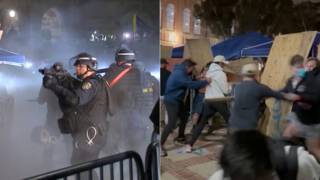
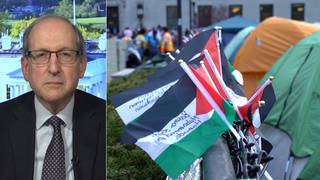





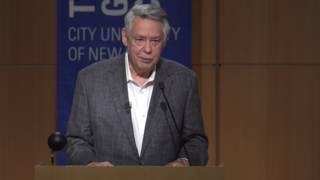

Media Options